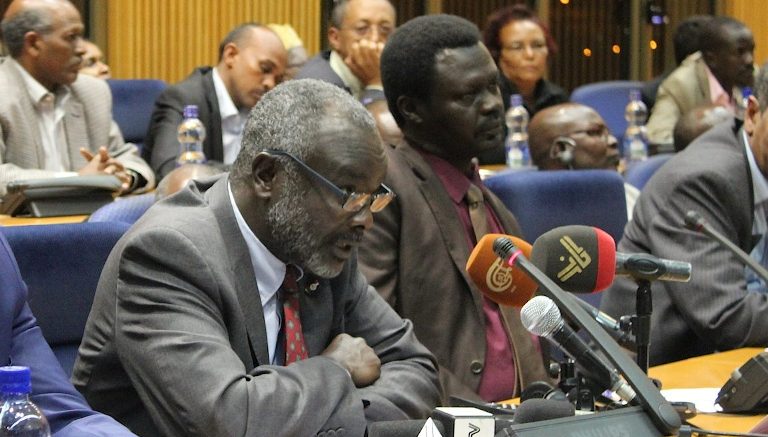Divergence over implementation mechanisms behind failure of Berlin meeting over Darfur: Sudan’s JEM

April 28, 2018 (KHARTOUM) – Darfur conflict parties have recently failed to strike a pre-negotiation agreement after Khartoum refusal to designate implementation mechanisms different from what is provided in the Doha Document for Peace in Darfur (DDPD), Sudan Tribune has learnt.
Gibril Ibrahim, leader of the Justice and Equality Movement (JEM) Saturday disclosed to Sudan Tribune they accepted that the DDPD be the basis of negotiations on two conditions. The first they can come to the negotiating table with any issue they deem necessary to achieve a just and sustainable peace, the second is to set up independent implementation mechanisms for any agreement to be reached.
Delegations from the Sudanese government, JEM and Sudan Liberation Movement – Minni Minnawi on the other side held a two-day meeting in Berlin on 16-17 April to discuss a declaration of principle ahead of the resumption of peace talks to end the western Sudan region conflict.
But the meeting wrapped up without a deal despite the high expectations as the mediation and facilitators worked hard to prepare a compromise breaking the stalemate over the DDPD framework agreement signed on 14 July 2011 between the government and several armed groups.
Gibril said the government initially proposed the parties should negotiate an agreement on the security arrangements and power-sharing in line with the DDPD but rejected to negotiate issues such as compensations and development pointing they have already been dealt in the Document.
“We refused, and finally the government accepted the first condition of negotiating issues the Movements bring to the negotiating table but did not accept the other condition because it believes that the DDPD has its own mechanisms, so the meeting did not achieve the desired goal,” he said.
“We told them that the Doha document is dead and that its term is over and legally it does not allow a third party,” he added.
“The government must be convinced that the mechanisms of the Doha agreement do not have the capacity to implement (what is agreed),” he further stressed.
Germany, United States, United Kingdom and Norway issued a joint statement on 24 April urging the Sudanese parties to remain engaged in the process and praised the concessions made by the two parties.
The four western countries further said they will “consider options for further progress together with the parties, partners and interested international actors”.
On the Peace Process
In addition, Gibril said they wished to fix four points including (1) the place of the DDPD in the future negotiations, (2) which mediation will broker the process, (3) the position of the international community in the talks, are they just observers, facilitators or guarantors (4) the clear identification of the parties participating in the peace process to avoid previous experiences where “the government inundated the negotiating table with fictive entities or individuals”.
The rebel leader pointed it is crucial to reach a deal over these four issues because it would pave the way for a successful process.
He added they also proposed a memo of understanding with the mediation so no one can come and dictate an agreement on the negotiating parties “as it happened with the Doha agreement”.
When the Doha process lasted for nearly two years, the mediation, which included the AU-UN joint chief mediator and the State of Qatar representing the Arab league, decided that DDPD should serve as a framework agreement -and not an agreement- to be signed by all the armed groups before negotiating a peace deal.
JEM which inaugurated the Doha process but later boycotted it before to accept to take part again in the discussions said this deal was negotiated with other groups and they proposed to open it for more talks. But the mediation rejected their request.
(ST)
